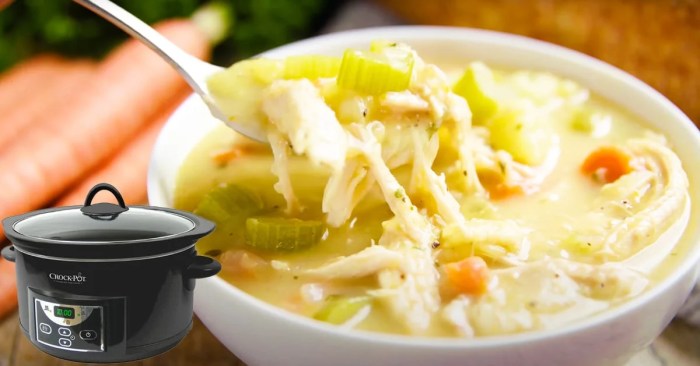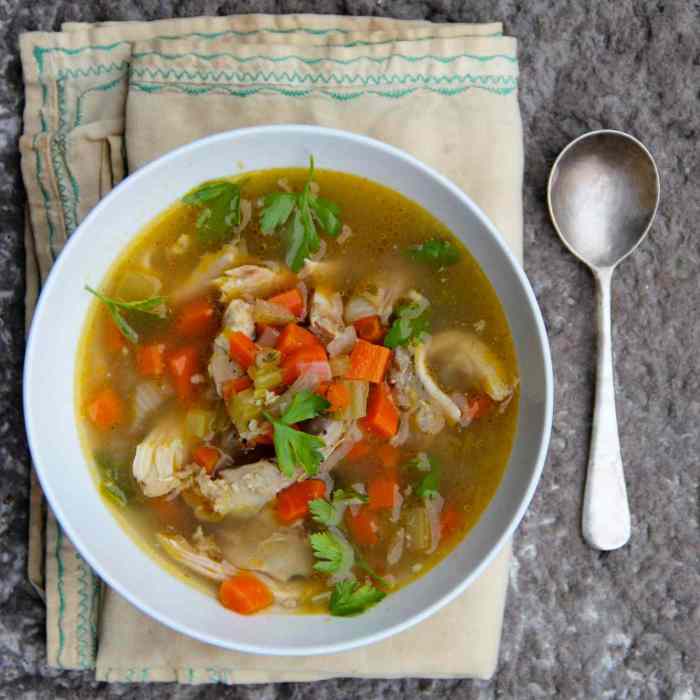Slow Cooker Turkey Soup: A Comforting Classic Reimagined: Turkey Soup Recipe In Slow Cooker

Source: tasteofhome.com
Turkey soup recipe in slow cooker – Slow cooker turkey soup offers a convenient and flavorful way to enjoy this hearty dish. The slow cooking process allows the turkey to become incredibly tender, while simultaneously infusing the broth with rich flavor. This method also minimizes hands-on time, making it perfect for busy weeknights or weekend relaxation. The versatility of slow cookers allows for countless variations, adapting to individual preferences and available ingredients.
Turkey soup itself boasts a long and varied history, appearing in various forms across different cultures, often associated with holidays and celebrations.
Essential Ingredients and Their Variations, Turkey soup recipe in slow cooker
A basic slow cooker turkey soup recipe typically relies on a foundation of simple, readily available ingredients. However, the beauty of this dish lies in its adaptability, allowing for creative substitutions and additions to suit personal tastes.
- Core Ingredients: Turkey (bone-in or boneless), broth (chicken or turkey), carrots, celery, onion, garlic, salt, and pepper.
- Turkey Variations: Bone-in turkey provides a richer broth due to the marrow, while boneless turkey offers quicker cooking times and easier serving. Ground turkey can be used for a heartier, almost stew-like consistency.
- Vegetable Alternatives: Beyond the classic carrot, celery, and onion combination, numerous vegetables can enhance the flavor and nutritional profile. Consider adding potatoes, parsnips, turnips, green beans, or even corn for a sweeter note.
| Vegetable | Description | Nutritional Benefits | Potential Substitutions |
|---|---|---|---|
| Carrots | Sweet, crunchy root vegetable. | Rich in beta-carotene (vitamin A), fiber. | Sweet potatoes, parsnips |
| Celery | Slightly bitter, crisp stalk vegetable. | Good source of vitamin K, fiber. | Leeks, fennel |
| Onion | Pungent bulb vegetable. | Contains antioxidants, sulfur compounds. | Shallots, leeks |
| Potatoes | Starchy tuber. | Source of potassium, vitamin C. | Sweet potatoes, turnips |
Step-by-Step Cooking Process
The slow cooker simplifies the turkey soup-making process, requiring minimal active time. Precise timing and temperature control are crucial for achieving optimal tenderness and flavor.
- Sauté onions, carrots, and celery in a little oil until softened. This step enhances the overall flavor.
- Add the sautéed vegetables, turkey, garlic, broth, salt, and pepper to the slow cooker.
- Cook on low for 6-8 hours or high for 3-4 hours, or until the turkey is very tender and easily shreds.
- Shred the turkey and return it to the soup. Stir in any additional vegetables (like green beans or corn) during the last hour of cooking on low.
- Taste and adjust seasonings as needed. If the soup is too thick, add more broth; if too thin, simmer uncovered for a while to reduce the liquid.
Flavor Enhancements and Recipe Tweaks
Experimenting with different herbs, spices, and broths significantly impacts the final flavor profile of your turkey soup. Adjusting the recipe to achieve desired spice levels is straightforward.
- Broth Options: Chicken broth provides a classic flavor, while turkey broth offers a deeper, more intense turkey taste. Vegetable broth offers a lighter alternative.
- Spice Combinations:
- Classic: Bay leaf, thyme, rosemary.
- Spicy: Cayenne pepper, chipotle powder, cumin.
- Herby: Parsley, sage, oregano.
Serving Suggestions and Variations

Source: diyjoy.com
Enhance the presentation and overall experience of your turkey soup with creative serving ideas and recipe variations.
- Serving Suggestions: Garnish with fresh herbs (parsley, chives), a dollop of sour cream or crème fraîche, or a sprinkle of croutons.
- Variations: Creamy turkey soup can be made by blending a portion of the soup until smooth. Turkey noodle soup is achieved by adding egg noodles during the last hour of cooking.
- Storage and reheating: Store leftovers in airtight containers in the refrigerator for up to 3 days. Reheat gently on the stovetop or in the microwave.
Nutritional Information and Health Benefits

Source: foodandwine.com
Turkey soup is a nutritious and comforting meal, offering a balance of protein, vitamins, and minerals. Its nutritional profile compares favorably to other similar soups.
Making turkey soup in a slow cooker is incredibly convenient; the low and slow cooking method ensures a deeply flavorful broth. If you enjoy hearty vegetable soups, you might also appreciate exploring other options like those found in this collection of slow cooker broccoli soup recipes , which offer similar ease and delicious results. Returning to our turkey soup, remember to season generously for optimal taste.
| Nutrient | Amount (per serving) | Unit | Health Benefit |
|---|---|---|---|
| Calories | 250-300 | kcal | Provides energy |
| Protein | 25-30 | g | Essential for muscle building and repair |
| Fat | 5-10 | g | Source of essential fatty acids (depending on ingredients) |
| Carbohydrates | 20-30 | g | Provides energy, fiber (depending on ingredients) |
Visual Representation of the Recipe
The finished slow cooker turkey soup should have a rich, golden broth, with tender pieces of turkey visible throughout. The vegetables should be softened but retain some texture. The consistency is generally hearty, but not overly thick. For serving, consider a rustic bowl, perhaps with a contrasting color to highlight the soup’s appealing golden hue. A sprinkle of fresh herbs adds a vibrant touch, enhancing the visual appeal.
Key Questions Answered
Can I freeze leftover turkey soup?
Yes, leftover turkey soup freezes well. Allow it to cool completely before storing in airtight containers for up to 3 months.
How long can I keep turkey soup in the refrigerator?
Store leftover turkey soup in an airtight container in the refrigerator for up to 4 days.
What if my soup is too thick?
Add a little water or broth to thin the soup to your desired consistency.
What if my soup is too thin?
Simmer the soup uncovered for a longer period to allow excess liquid to evaporate. Alternatively, you can thicken it with a cornstarch slurry (mix cornstarch with cold water before adding).
